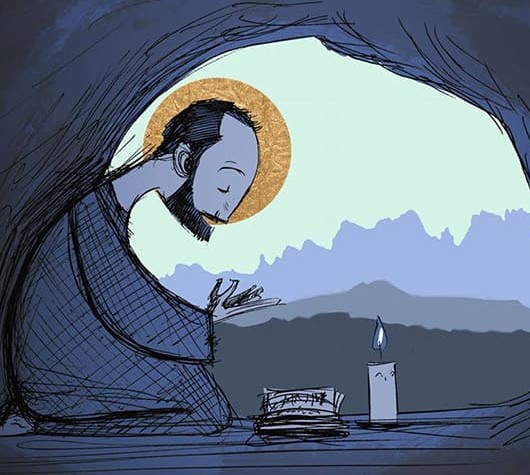Thirty-Second Sunday in Ordinary Time
“… but she, from her poverty, has contributed all she had, her whole livelihood.” Mk. 12:44
“In God We Trust”
We all recognize these words. Two thousand years after the time of Jesus, they are the ones minted on all our currency. As such, they are supposed to serve as a reminder of what our ultimate values should be. The irony, of course, is that too often our coins, our dollar bills, our wealth, our status, our possessions send us off in an entirely different direction – the direction taken by “the Scribes” in today’s gospel story.
Jesus’ fiery description of them can make most of us wince. Because what the Scribes in today’s gospel are accused of hits awfully close to our own weaknesses: our desire for the three “P’s” of power, prestige and possessions – or, as Mark puts it, seeking “seats of honor,” dressing in the most noticeable fashions, looking for praise from the crowds.
Bottom line: Each of us making ourselves the center of all that’s important. The Look At Me, Ain’t I Wonderful syndrome.
But then Jesus gets very particular. Listen to how angry he becomes when he makes this accusation: “They devour the houses of widows” while reciting “long prayers.” Jesus abhors this hypocrisy so much that he predicts that they “will receive a very severe condemnation.”
Why so much anger?
Because widows were the most desperate and destitute of all people in ancient times. The social situation in which they found themselves is difficult for us in modern society to understand. But perhaps this will help us grasp how defenseless they were: there was no social security, no health insurance, no guaranteed jobs, no affirmative action, no advocacy groups, no protected bank accounts – and, maybe most importantly – no legal rights of any kind.
What these “Scribes” were doing was taking advantage of the widow’s impoverished and defenseless situations, and, at the same time, piously praying “long prayers” to enhance their standing with God.
This is why Jesus became so angry.
But then he does a complete turn-around. Jesus becomes so enthused, in fact, that he turns to his disciples, points to the widow in today’s gospel story, and in effect says to them:
“Look! See that? This is what I’ve been talking about. This is what I’ve been trying to get you to see. Unlike the Scribes, there’s no showmanship or attention seeking, there’s no worrying about what she will have left over for herself, there’s no giving from her surplus, ‘but she, from her poverty, has contributed all she had, her whole livelihood.’”
The “poor widow” of the gospel becomes the model for authentic spirituality. She becomes the spot-on example of “In God We Trust.” She becomes the one who lets go of her “whole livelihood,” and, in doing so, becomes the supreme disciple – the one who gives away all that she has, so that God can give her even more.
The widow understands somehow that true spirituality is not about “long prayers” that will gain acclaim from others. Instead, it’s about getting our egos out of the way so that God has room to work within us; it’s about subtracting the desires for power, prestige and possessions so that we can then be free – free to focus on the two coins in today’s gospel story; the coins that represent the two great commandments of love: love of God, and love of neighbor.
The widow in our gospel story got that. So did the widow in our first reading today who was in so desperate a situation that she was prepared to die. But, out of her poverty, she responded to the Lord and became the object of abundant grace.
Both of these widows are reckless – totally irresponsible in giving what little they have and placing their trust fully in God.
Jesus, as we know, will then go and do the same – recklessly abandon himself and his own temptations for power, prestige and possessions on a cross – only to be embraced totally by the God of Abundance and become the source of all Grace.
“In God We Trust” says our coins.
Do we?
11/5/15
11809194.1




